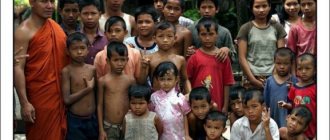It is very difficult without parents, so the country is trying to provide benefits to orphans. In Russia there are about 50 thousand minors whose parents have died. The state provides every possible assistance to such people in the form of household support and housing. They also help orphans get an education, provide the opportunity for sanatorium recreation, etc.
Who are orphans?
The legislative acts reflect two categories of beneficiaries, which have some similarities. They concern children who cannot receive attention and care from their parents. The first group is represented by orphans, the second - children who were left without parental care. Persons whose parents have died are considered orphans. The reason for this is some kind of incident.
If we talk about children who were left without care, then this is a different category. These include citizens whose parents were unable to properly bear obligations. These responsibilities arise from parental status. Obligations are reflected in legislation.
The reason for failure to fulfill obligations is:
- deprivation of parental status;
- in accordance with the established procedure, recognition of a person as having lost legal capacity;
- the passing of a sentence by a court by which a person is deprived of his liberty;
- the person is considered dead or missing.
Most often, the listed statuses give a person the opportunity to take advantage of benefits in equal amounts.
Social preferences
Orphans have access to some privileges when applying for a job, medical care, paying for utilities and other areas.
The relief when applying for a job is that such citizens receive increased unemployment benefits for the first six months - as a rule, this is the average salary in the region. In addition, upon dismissal due to the fact that the organization was liquidated or due to layoffs, the orphan has the right to demand that the organization receive vocational training at the expense of the enterprise and further employment.
At the regional level, orphans have the right to receive relief on utility bills, including electricity, water, gas and rent. Special rules have also been established, based on which an orphan has the right not to pay debts for utility services of his parents and debts for the time during which the person did not live in place. Guardians have the right to receive compensation for utility costs.
At the regional level, orphans may be provided with discounts on utility bills
In the medical field, there are a number of preferences at the regional level:
- free use of medical services;
- receiving medical supplies free of charge;
- receiving baby food free of charge;
- receiving vouchers to various sanatoriums and resorts free of charge.
It is possible to receive the following types of social assistance:
- receiving benefits in the form of free use of public transport;
- privileges when enrolling in kindergartens, including the opportunity not to pay (for persons who have formalized guardianship);
- the opportunity to visit art and sports educational institutions free of charge;
- the opportunity to visit zoos, circuses, etc. free of charge.
Extract from Federal Law N 159-FZ “On additional guarantees for the social protection of orphans and children left without parental care”
Cash payments
Government bodies pay a lot of attention to issues related to minor citizens. This is due to the fact that they become fully capable from the moment they reach adulthood. Decisions that have legal significance are made for them by their legal representatives. If the parents die, then the state provides payments to the child related to the loss of breadwinners in this case. In addition, payments may be of a social nature.
Benefits for the loss of a breadwinner can be assigned provided that the deceased have insurance experience. This type of payment includes two components.
These include:
- basic component;
- insurance
The size of the insurance portion depends on the amount of pension savings. If a child’s two parents died at the same time, then when calculating benefits, employees of the pension authority take into account the bases for that parent, using whose savings the payment will be greater. This rule applies in a situation where both parents worked officially.
Sometimes deceased parents do not have insurance coverage. Then the children are given pension benefits after their death. The approximate value is 12 thousand rubles. Sometimes the indicated amount increases. It depends on the region in which the minor lives. The provisions of local regulations are applied, which reflect the application of the corresponding surcharges.
ATTENTION !!! The listed benefits are used by orphans until they reach their 18th birthday. Sometimes provision is made for an extension of benefits.
This happens provided:
- the child enters full-time education;
- age category up to 23 years.
You can receive preferences up to 23 years of age.
Benefits and allowances
The main question arises: what benefits are given to orphans after the age of eighteen? Firstly, after completing a school course, each orphan acquires the right to continue education in a secondary specialized or higher educational institution. And this is, perhaps, one of the main moments at the beginning of the adult life of this category of citizens. The extension of enhanced government support directly depends on whether the orphan chooses to continue his education or complete it after school. Having refused the university, he almost immediately loses the package of additional benefits. This does not mean that a person loses the rights to all privileges, but one should not count on payments, benefits and support in the process of future employment.
Probably for this reason, in the last decade more and more orphans continue their education at institutes, universities, colleges, technical schools and schools. Firstly, because all orphans have the right of priority for admission to educational institutions. Of course, academic performance in high school and exam results are taken into account, so not every orphan can enter, for example, Moscow State University. However, an orphan will have a better chance of getting a place than any other applicant who has exactly the same USE results as him. But here we need to make an explanation - most applicants from this stratum are admitted according to quotas, so they do not have to compete with other potential students.
Read more in the article: Benefits for full-time students in 2019
It is recommended that young people who grew up without parents enroll in a university or secondary specialized institution immediately after completing a general education course. The fact is that benefits will not be provided if the orphan wants to get an education later - social protection will apply specifically to students aged 18 to 23 years.
So, after admission, the person remains supported by the state. Here are the types of benefits he is entitled to:
- Completely free travel on public transport around the city, on suburban routes, and, if necessary, rural routes are included here.
- Full provision of office supplies, textbooks and, if necessary, other books is provided in the amount of three scholarships, therefore, the amount varies depending on the university and region.
- Full provision of shoes, seasonal clothing and everything necessary.
- Completely free medical services.
The legislation also determines what payments are due to an orphan after the age of eighteen (Federal Law dated December 21, 1996 N 159-FZ (as amended on May 1, 2017) “On additional guarantees for social support for orphans and children without parental care”). The situation with payments is such that in addition to pensions, there are other types of benefits for orphans after eighteen years of age:
- One-time assistance upon admission in the amount of 20,639 rubles.
- Increased scholarship - it is one and a half times more than usual for a particular educational institution.
- Social scholarship for low-income students 2021.
- Annual additional payments.
- In case of internship, payment will be made as for full-time work activity.
- One-time payment after graduation.
Orphans' pension - the amount may vary. It depends on the life circumstances that preceded the loss of your parents. If the parents did not have sufficient experience, the child is assigned a social pension. Now its amount for orphans is 10,178 rubles. Otherwise, a survivor's pension is assigned, and it depends on what salary the breadwinner received and how much length of service he had. In the latter case, an individual calculation will be made.
Relaxation during studies
When an orphaned child begins to study, he is entitled to additional assistance from government agencies. The main condition is to be under the age of 23 years. In this case, the student is entitled to preferences in the form of clothing and shoes, as well as the necessary equipment for studying. In addition, the orphan receives equipment. The minimum list is reflected in acts issued by the Government.
If the beneficiary does not want to use assistance in kind, he can write an application and replace it with cash payments. They will pay an amount equal to the value of the things owed to the citizen. Payment of compensation occurs in cashless form. The funds are transferred to an account opened in the name of the beneficiary.
Conditions for employment of orphans!
Upon completion of training, upon further employment in enterprises, including commercial organizations, graduates are provided with everything necessary at the expense of the state (clothing, equipment, etc.). These standards for orphans are determined by Decree of the Government of the Russian Federation No. 409 of June 20, 1992 “On mandatory urgent measures aimed at protecting orphans.” Federal Law No. 159 Art. 9 regulates the procedure for employment of this category of the population.
According to the law, representatives of state employment services, after graduates of this category aged 14–18 years apply to them, are obliged to carry out professionally oriented work with them to check their professional suitability.
All activities must be carried out taking into account the health status of graduates and their profile specialization in which they studied at the educational institution.
Persons who first applied to the employment service in order to find a job and at the time of application are registered with the state employment service as unemployed are guaranteed payment of unemployment benefits. This benefit is paid to a citizen of the Russian Federation within 6 months from the date of application. The amount of the benefit corresponds to the level of the average salary, which is fixed in a certain region, district, city, territory, autonomous district, republic.
If a child left without parental care leaves the organization due to the liquidation of its activities due to staff reduction, his maintenance falls on the shoulders of the employer. When dismissing a person of this category, the employer must understand that, upon liquidation of his company, he is obliged, at his own expense, to conduct vocational training for the employee and subsequently ensure his employment in his or another company, regardless of the form of ownership.
In addition to government agencies, charitable organizations provide travel packages for children left without parents.
Getting education for free
The legislator provides for the child’s opportunity to receive an education. This happens on a par with those who also belong to preferential categories of citizens. A person receives education in a specialized educational institution. To use the exemptions, you will need to meet certain requirements. Including, the person must be included in the preferential category. In addition, the faculty he has chosen must provide budget places.
IMPORTANT !!! It will be possible to receive education free of charge if this happens for the first time. In addition, the child will need to pass tests when entering a university. Often educational institutions develop conditions under which an orphan can begin studying for free. These conditions include the fact that the citizen has a general education, which is documented.
Before entering a university, you need to pass exams at school and pass tests at an educational institution. Sometimes the rules are simplified, provided that the person has passed the Unified State Exam with high scores. When taking the entrance exams, the orphan will need to score enough points to be considered sufficient. The number exceeds the minimum value. These benefits are used by orphans after they reach adulthood. However, laws limit the maximum age of use. It is equal to 23 years.
The state has a separate policy area, in accordance with which places are allocated to children recognized as orphans. There are several options for obtaining educational services. This applies to higher and secondary education. A citizen can be enrolled in the faculty, provided that he has the same number of points as other applicants.
Sometimes admission occurs out of competition. To do this you need to be successful in sports or science. You can enter into an agreement on a quota. To do this, after completing the training, you need to work for several years at the enterprise that paid for your studies. This time is from 3 to 5 years.
What is due to an orphan by law from the state after 18 years of age?
The state has also prepared significant support for adult orphans. What is due to orphans from the state after 18 years of age:
- employment payment;
- EDV upon graduation from a university or secondary educational institution;
- one-time assistance after the end of patronage, guardianship, when the orphan goes into independent life;
- upon graduation from a boarding school, orphanage and other similar institutions;
- When enrolling in a university/secondary educational institution, a payment is also due.
To apply for social benefits, a permanent residence permit is required in the city in which he applies to social security. If a couple gets married, has a child, and both spouses are orphans, then they are entitled to additional monthly child support. But in order to process such payments, a number of conditions must be met, which vary by region.
Scholarships
When completing training, citizens who are orphans have the opportunity to receive scholarship payments. Increased size. This amount does not affect survivor benefits in any way. Payment of scholarships is carried out during the entire time the citizen is studying full-time. He can undergo training at a secondary or higher educational institution.
The amount of payments exceeds those entitled to ordinary students who do not have benefits. The supplement is up to half the amount of the regular scholarship. In addition, the group of people in question has the opportunity to use additional benefits. They are expressed in the rights to receive payment in the amount of one hundred percent when completing an internship. This applies only to production practice. Every year, orphans receive a payment equal to three scholarships. It is intended for the purchase of office supplies.
The procedure for providing benefits and payments to orphans
Good afternoon An orphan is a person who has lost one or both parents due to the death of the latter. As a rule, this term is applied to children who have not yet reached the age of majority (18 years old). I will answer you immediately about all the benefits that are due. CASH PAYMENTS Regional social supplement to a social or labor pension in the event of the loss of a breadwinner up to the value of the city social standard City social standard of minimum income (pension + supplement): 2011
– 11,000 rubles; 2012 - 12,000 rubles. Funds for the maintenance of a child in his care until he reaches the age of 18 (for full-time students in general education institutions - until graduation). If these organizations belong to the municipality or the state. They are also provided with additional social guarantees. All of them are valid until the end of training. Among them:
- payment of benefits for the purchase of stationery and textbooks. Occurs annually and equals three scholarships. Provided within 30 days from the beginning of the academic period from budgetary allocations allocated for these purposes to educational institutions;
- increased scholarships. Half as much as other students;
- 100% accrued earnings during industrial training (practice).
Persons who have already completed the full cycle of general secondary education or the main cycle of general education have the right to study in preparatory courses for further entry into secondary and higher vocational education organizations. And for free. Up to 23 years of age - for the period of stay (study). Free meals in general educational institutions. Students in general educational institutions - during the period of study. Provision of free textbooks. For students in educational institutions implementing general education programs - during the period of study. An increase in the amount of the scholarship by at least 50%. Paid at the place of study during the period of study in state educational institutions of primary, higher and secondary vocational education. An annual allowance for the purchase of educational literature and writing materials in the amount of a three-month scholarship.
The second parent pays child support and is permanently involved in the child’s life (picks him up on weekends, takes him to school, to clubs, stays with him for overnight stays) or withdraws himself from the child’s life. A child raised by only one parent is not considered an orphan. But if a child or teenager has no parents at all, then he is called left without parental care. The reasons why a child remains an orphan may be the following:
- mom and dad died due to natural causes or died tragically;
- parents lead an asocial lifestyle, therefore they are deprived of the rights to raise their children;
- mother and father were declared incompetent;
- they ended up in prison and served their sentences in a closed colony.
It is important to understand that if an orphan is taken into the care or guardianship of relatives, then the legal status of the child is not removed
Housing benefits
If an orphan is maintained in an orphanage, then upon turning 18 years old, the state must provide him with living quarters. While the beneficiary is undergoing training, government agencies are directing their efforts to resolve issues related to the provision of housing. In particular, accommodation in dormitories is guaranteed. A citizen has the right to use such housing, provided that it is located at an educational institution and he has not reached 23 years of age.
Orphans are also provided with meals at the educational institution. State bodies pay for it. If local authorities do not have the opportunity to allocate a place in a dormitory for a child, then they are provided with funds to rent other housing.
Who can get the status
Orphans include minors who have lost their parents due to their death. It is these citizens who are entitled to all kinds of social payments and government benefits. A similar measure is prescribed in the relevant Federal Law on orphan state support.
Benefits for orphans and children without parental care are provided on a mandatory basis. The latter can find themselves in such a difficult situation for various reasons, if the mother and father:
- deprived of rights;
- declared incompetent;
- considered dead/absent;
- evade fulfillment of obligations to educate, protect children's interests or rights;
- are serving time in prison or are under investigation accused of a crime;
- unknown;
- they refuse to take their offspring from medical institutions, educational organizations and other institutions that provide social services to the population.
The law also guarantees preferences for adults under 23 years of age if they are orphaned before their 18th birthday. Also, preferential subsidies are given to orphans aged 18-23, if during this period they underwent training, for example, were college students, etc.
For transport
Orphans are protected by the state to the maximum extent possible. Therefore, in addition to the listed benefits, they are also entitled to preferences related to movement on public transport. This applies to those types of funds that operate within the municipality. If an orphan decides to use the services of private cab drivers or taxis, then he must understand that in this situation the payment falls entirely on his shoulders.
If the child has medical conditions, then he is issued a permit. It gives you the right to go for spa treatment. In this situation, all costs are borne by government agencies.
What benefits are provided?
The right to receive assistance arises before reaching the age of 18, but some forms of support are available only to adult citizens who are studying at public universities.
Under 18 years old
Minor orphans have the following preferences:
- monetary allowance;
- free services in medical organizations;
- nutrition in preschool and school institutions;
- annual spa treatment;
- preferential right to enter a university.
Monetary allowance is represented by two types of pension. A work permit is assigned if at least one of the parents was officially employed.
If both worked, then the calculation is made based on the highest income. Social benefits are assigned if the mother and father were not employed. The payment amount is fixed and is recalculated every year taking into account inflation.
Reference! In 2021, the social pension is 5240.65 rubles if one parent is absent and 10481.3 if both are absent. There is also a new form of payment if the child’s parents have not been identified. It is paid until the age of 18, or 23 for full-time study.
Minor orphans receive all medical services free of charge, including special examinations.
Many constituent entities of the Russian Federation provide such children with milk nutrition until they reach the age of 2 years.
A regional service also includes assistance in obtaining free medications, and this right can last until the age of 23 if the orphan is studying full-time.
Every year, a child can receive a ticket to either a sanatorium or a health camp.
Orphans have a preferential right to enroll in a university or secondary specialized educational institution in a budgetary department.
This applies exclusively to first education and does not apply to master’s and postgraduate studies!
In addition to the main privileges, additional support measures are provided at the regional level:
- monthly benefits;
- free admission to museums and other cultural and entertainment events;
- free use of public transport;
- benefits or complete exemption from paying utility bills.
Important! If a child is assigned a guardian or is taken into care by relatives, he retains all federal and regional privileges.
Scholarship for Russian students in 2019
However, in 2021, scholarships were raised slightly. Let us recall that Dmitry Medvedev signed a decree according to which the cost of living was set at 9,662 rubles, which is significantly higher than the amount of payments due to students. The Ministry of Education spoke about the need to reconsider scholarships, emphasizing that higher payments will pay for themselves in the future.
Not long ago it became known that the Ministry of Finance initiated a reduction in budget allocations for the implementation of state programs “Development of Education” and “Development of Science and Technology.” In the last days of July 2021, Dmitry Medvedev, who holds the post of Prime Minister of the country, held a meeting to develop approaches to optimizing these programs and other expenditure items. The result was a decision to freeze general budget expenditures in the amount of 15.78 trillion rubles per year for the period from 2021 to 2021.
We recommend reading: Is it possible to obtain a technical passport for an apartment in the MFC
Scholarship for Russian students in 2019
Today, prices for food, clothing and transportation are at such a high level that scholarship awards make it absolutely impossible to cover these expenses without resorting to additional part-time work or financial assistance from parents. Moreover, the first of these solutions to the problem occurs as often as the second - not all mothers and fathers can fully provide for the needs of an adult child.
The increase was completely insignificant (about 3%), so the Ministry of Education and Science continued to appeal to the country's leadership with a request to raise scholarships. The department’s main argument was that increasing budget expenditures for this purpose should pay for itself in the future, because a student who devotes the proper time to studying will give up part-time work and become a competent specialist who will benefit his country. However, current information about possible indexing remains disappointing.








